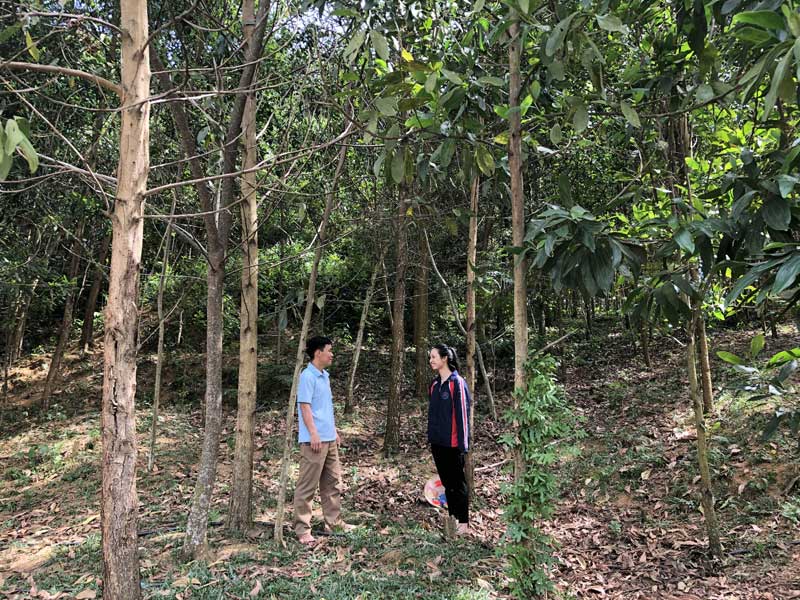
(HBO) - Hop Tien commune is located in the core area of Thuong Tien Nature Reserve. Therefore, the work of protecting and developing forests is determined as a key task by Party Committee and the authorities and it needs to be strictly implemented. Since the merger, the locality has implemented many measures to preserve forests.

The officials of Hop Tien commune (Kim
Boi) have been propagating to the forest fire prevention and fighting to the
local in the hot season.
Currently
there are 4,310.26 ha of special use of forest land, 553.84 ha of protective
forests in the commune. The entire forest area of Hop Tien is always
well-protected with no forest fire and no case of violating the Forest Law. The
forest cover has reached 85%. The commune has planted 23 hectares of new
forests, exceeding 3 hectares compared with the whole year target. Thanks to
the afforestation and the economic development from the forest, people's lives
have been improved, and many families have become from afforestation.
It
is a locality having a large area of forest land, and located in the core area
of Thuong Tien Nature Reserve with fresh air. These are the favorable
conditions for the people to take advantage of exploitation of forest resources
such as planting production forests, developing beekeeping for honey,
especially if Hop Tien commune can exploit well, tourism can be developed. The
road from the center of the commune to the hamlet is now easy for travelling,
it is no longer bumpy as before. Khu hamlet has been retaining the cultural
identity of Muong ethnic people with the stilted houses hidden on the mountains
and the green terraced fields. The small village is sheltered by the immense
green forests and tall ancient trees, going deep into the forest there are
small streams gurgling all year round ... There have been many groups of
visitors coming here to experience the journey of discovery and they feel
really interested.
In
order to exploit the potentials and strengths of the forest, all levels and
branches have had the policies to develop tourism in Khu hamlet. Currently, Hop
Tien is restoring and developing the local specialties, building the brand of
the specific agricultural products, preserving the cultural identity of Muong
ethnic people to towards tourism. At the same time, they have closely collaborated
with the Management Board of Thuong Tien Nature Reserve to better protect
forests.
Hoa Binh province is undergoing a dynamic transformation amid Vietnam’s national digital transition. Building on Poliburo’s Resolution No. 57-NQ/TW on breakthroughs in science, technology, innovation, and national digital transformation, the province has rolled out a wide range of practical action plans. A standout initiative is the "Digital Literacy for All” movement, an effort to ensure that no one is left behind in the digital era.
Hoa Binh province is undergoing a dynamic transformation in the wake of the national digital transformation movement. Building on Resolution No. 57-NQ/TW of the Politburo on breakthroughs in science, technology, innovation, and national digital transformation, the province has implemented a wide range of practical action plans. A standout initiative is the "Digital Literacy for All” movement ambitious effort to ensure that no one is left behind in the digital age.
With a spirit of unity and proactive problem-solving, the Party Committee, the government and the people of Dong Lai Commune (Tan Lac District) have made great strides in implementing the resolutions of the 24th Party Congress of the commune for the 2020 - 2025 term. Focusing on leadership and practical actions, the commune has brought the Party’s resolutions into daily life, creating strong impacts and pushing the local development forward.
Amid the nationwide push for digital transformation, young people in Hoa Binh Province are stepping up as dynamic pioneers, applying technology to enhance Youth Union operations and expand the reach of youth-led initiatives. Through creativity and adaptability, Youth Union organizations at all levels have introduced a series of practical solutions, contributing to modern governance and community development.
In recent years, An Nghia commune, located in Lac Son district, has stepped up administrative reform, focusing on improving the quality and efficiency of its single-window service unit for receiving and processing administrative procedures. These improvements have helped create favourable conditions for local residents and organisations to handle administrative procedures, contributing to the commune’s broader socio-economic development.
The Prime Minister-approved master plan to develop the multi-use value of forests ecosystems through 2030, with a vision to 2050, aims to improve the management and sustainable use of forest resources, create jobs, increase incomes, and improve the living standards of ethnic minorities, people in mountainous and remote areas, forest workers and those living near forests.



